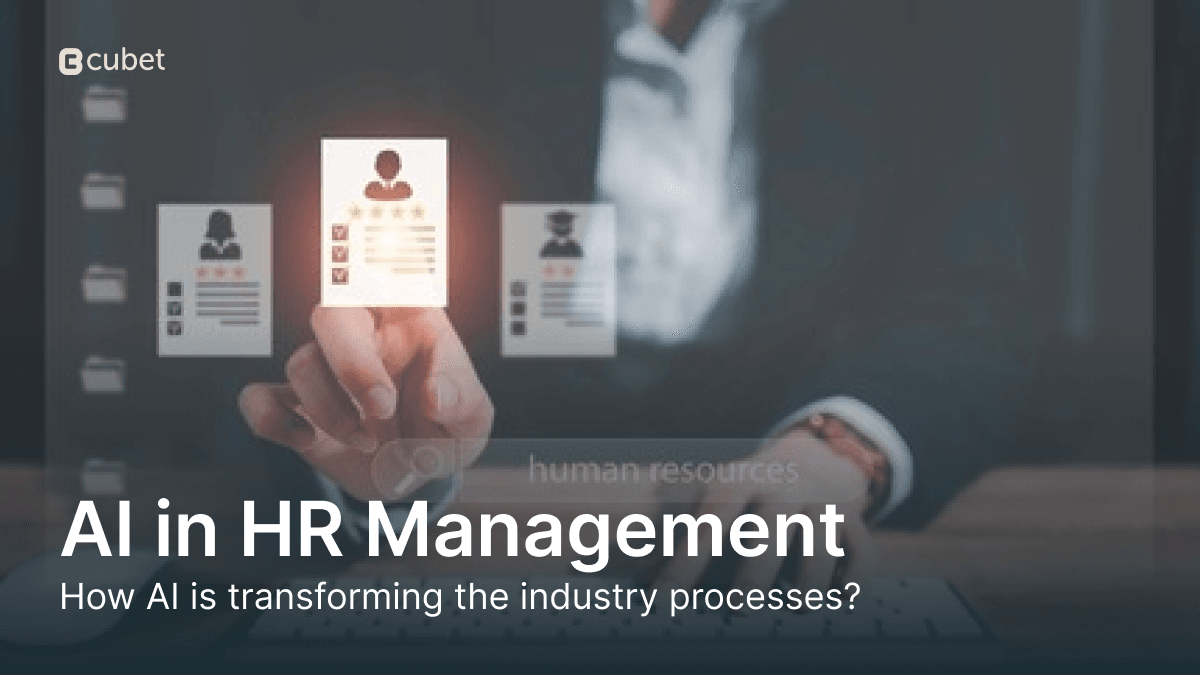Integrating Artificial Intelligence (AI) into Human Resources (HR) signifies a significant shift in workforce management. Almost 67% of HR workers think AI has many benefits and improves the hiring process. This transformation, driven by AI, is redefining traditional HR practices. AI in HR completely changes how HR works, making everything better.
Human Resources is changing from a field based on human opinion to one based on data and analytics thanks to artificial intelligence (AI). This shift is significant as AI introduces new methods for handling HR tasks. AI enables a deeper analysis and understanding of HR processes.
AI is also optimizing the work experience for employees, not just hiring them. It makes training and development programs fit the needs of each employee, encouraging a mindset of learning and growing all the time.
Now, let's explore the specific impacts of AI on HR practices.
How AI Is Reshaping HR?
Artificial Intelligence (AI) is profoundly changing the human resources (HR) ecosystem, bringing about a new era of efficiency and strategic decision-making. The way AI is reshaping HR, from automating routine tasks to enhancing the overall employee experience and recruitment processes, is noteworthy.
Let's explore the various ways AI is making a positive impact in HR.
Automation of Routine Tasks
AI's introduction into HR has automated numerous routine tasks. Screening resumes and setting up interviews used to take a lot of time, but now AI programs do them quickly and easily. This technology does more than just save time; it also adds a level of precision and accuracy that wasn't possible before. AI can process and analyze vast amounts of data, which frees HR professionals to focus on more critical administrative chores.
Personalizing Employee Experiences
AI's analytical prowess is not limited to recruitment. It extends to personalizing employee experiences, a crucial aspect of HR. AI systems analyze individual employee data from onboarding to professional development. This personalization is based on understanding each worker's unique journey, tastes, and potential, which makes them happier at work and more likely to stay with the company.
Data-Driven Decision Making
AI in HR epitomizes the shift towards data-driven decision-making. AI analyses diverse metrics, including employee performance and engagement, providing HR professionals with actionable insights. This capability is not just about understanding the present; it's about predicting future trends. AI's predictive analytics can see problems coming, like employee loss, so companies can take proactive steps to preserve deserving candidates.
Efficient Recruitment Processes
Recruitment is another area where AI is making significant inroads. AI tools make recruitment more accessible by ensuring faster and more effective candidate selection. These tools go beyond mere efficiency. AI also improves the candidate experience, providing timely communication and feedback throughout recruitment.
Improved Decision-Making with AI
AI tools in HR contribute to more accurate and informed decision-making. By analyzing data from recruitment processes, AI identifies patterns and challenges, allowing HR teams to make decisions based on solid data. This approach helps select the right candidates and offer suitable compensation plans, reducing biases and guesswork.
Enhancing Efficiency in HR Processes
AI also plays a significant role in boosting efficiency within HR departments. It automates repetitive tasks, freeing HR professionals to focus on more strategic aspects of their work. AI in screening and selecting candidates speeds up the recruitment process and reduces the costs associated with hiring and training.
Challenges of Implementing AI in HR Management
Using AI in HR management requires addressing problems such as protecting data privacy, maintaining unbiased algorithms, and smoothly integrating AI with current systems. Furthermore, maintaining the accuracy and reliability of AI judgments is essential, requiring ongoing updates and human monitoring to fit with changing labor patterns and regulations.
But a common misunderstanding about using AI in HR management is that it will cause many people to lose their jobs. AI can do some HR tasks automatically, but its main goal is to make people smarter.
AI could automate boring tasks, giving HR professionals more time to work on important things like developing talent and keeping employees engaged. Using AI in HR opens up new job opportunities and roles that need people who know how to manage and analyze AI.
For now, let us look into some challenges that can affect the implementation of AI in HR management.
Data Privacy and Security
The adoption of AI in HR raises critical concerns regarding data privacy and security. Handling sensitive employee data responsibly is paramount. AI systems must be designed to protect personal information, adhering to stringent data protection regulations and ethical standards.
Bias and Ethical Considerations
AI systems, while powerful, are not immune to biases. Ensuring that AI algorithms in HR are free from inherent biases is very important. This involves continuous monitoring and auditing of AI systems to identify and eliminate discrimination, confirming fairness and inclusivity in all HR processes.
Integration with Existing Systems
Integrating AI into existing HR systems presents technical and operational challenges. Seamless integration requires a strategic approach, ensuring that AI tools complement and enhance current HR processes without causing disruption.
Employee Acceptance and Adaptation
The successful implementation of AI in HR also hinges on employee acceptance and adaptation. To get the most out of AI in HR, HR workers and employees must be taught how to use AI tools. Clear communication and training are essential for maintaining employee acceptance of AI in HR, as they reduce fears and promote adaptability to new technologies.
AI Accuracy and Reliability
The accuracy and reliability of AI systems are most important in HR management. Inaccurate or unreliable AI can lead to flawed decision-making, affecting everything from recruitment to performance evaluations. Ensuring the precision of AI-given solutions is a complex challenge requiring continuous effort.
Exploring HR Excellence: Real-world AI Illustrations
As artificial intelligence continues transforming different areas, so does it impact HR. AI in HR means adding different software tools and programs to the HR system. These tools significantly affect HR because they make processes more efficient and effective, improving employees' experience.
Let’s look into some organizations that have integrated AI into their business.
Electrolux Group’s Integration of AI in HR Processes
Electrolux Group's strategic use of AI in tackling a recruitment challenge showcases AI's powerful impact on HR. Electrolux saw a remarkable boost in their recruitment process by integrating AI platforms. An 84% increase in the rate at which applicants moved through the hiring process and a 20% drop in hiring new staff made this clear. This example illustrates how AI can also lead to tangible, measurable improvements.
Workday's Integration of AI in HR Processes
Workday's use of AI in HR shows how useful AI can be in many areas. When AI tools like automatic contract comparison and personalized knowledge are used, they show that AI can make many HR jobs better. AI's ability to use current data, like skills and location, shows how important it is for improving HR processes.
Cubet's AI Solutions for Business Enhancement
Reflection on the importance of innovation in AI for continuously enhancing business is essential. Cubet's AI solutions exemplify this principle. Our company offers a range of AI tools designed to address various aspects of business management, including HR. These tools represent a new way of approaching business challenges.
Cubet's AI solutions enhance key business functions like recruitment and performance management.
Conclusion
The integration of AI in HR indicates the evolving nature of workforce management. This level of analysis was previously unattainable with traditional HR methods.
The way companies handle their employees will change due to AI in HR. This technology helps with hiring by making it easy to pick the best people and guess how well they will do. For each worker to get the right skill improvement, AI ensures that training fits their needs regarding employee growth.
While integrating AI in different fields, its impact on HR is mind-boggling. Utmost care must be taken to integrate it into the HR department to make your organization run smoothly. With Cubet’s skilled and trained professionals, we provide these integrating services to smoothen your organization's flow and automate your tasks without disturbing your current structure. If you want to change how you use AI in your organization to benefit your business, connect with us today! And take your business to the next level.
Have a project concept in mind? Let's collaborate and bring your vision to life!
Connect with us & let’s start the journey
Share this article

Get in touch
Kickstart your project
with a free discovery session
Describe your idea, we explore, advise, and provide a detailed plan.



























